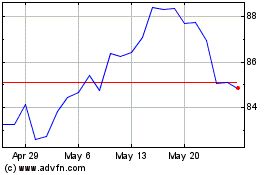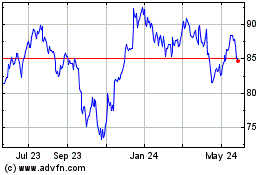REIT ETFs in Taper Aftermath: Any Hope for Gains Now? - ETF News And Commentary
December 27 2013 - 7:00AM
Zacks
The going wasn’t easy for the REIT industry in 2013, particularly
in the latter part of the year which saw some volatile business.
The sector had held up pretty well till mid May. Then came taper
talks and with it, rising interest rates. This by and large
impacted the performance of the REIT sector.
Finally the Taper
After months of speculation, the Fed finally announced that it was
beginning to taper its QE bond buying program in its last FOMC
meeting. On a monthly basis, the Fed will now buy $75 billion in
monthly assets, down from the current rate of $85 billion a
month.
A gradually improving economy and lower levels of unemployment were
cited as the chief reasons by the Fed to start tapering (read: Fed
Tapers Bond Purchases: 3 ETFs in Focus on the News).
However, the best part of the taper news is that the Fed would
continue to keep interest rates low throughout 2014 in order to
boost economic growth. In other words, the Fed made it very clear
that ‘Taper’ and ‘Rising Rates’ are not synonymous. The Fed will be
following an accommodative monetary policy stance until the
unemployment rate drops below 6.5%.
Impact of Fed Outcome on Interest Rates &
REITs
The news of tapering has seen a mixed reaction from market experts.
A section of analysts believe that 2014 will definitely be positive
for REITs as the Fed will continue to keep interest rates low
through the year.
However, some experts believe that tapering by the Fed will cause
interest rates to rise. In fact, the rates for the 10-year U.S.
Treasury have jumped to 2.94% as of Dec 23, 2013 from 2.89% as on
Dec 18 (read: Rising Rates and Soaring Stocks: Time for Convertible
Bond ETFs).
This represents a modest jump, as current yields are almost at a
two-month high. The rise in yields implies that investors are not
convinced that the Fed will succeed in keeping interest rates at
rock bottom for long. Though the Fed might keep short-term
rates near zero, an improving economy would definitely lead to a
rise in 10-year Treasury yields.
A rising interest rate environment raises concerns about the
performance of REIT stocks. A jump in rates would force REITs to
pay higher amounts to borrow money which in turn would impact its
dividend yield. This is due to the fact that REITs are required to
distribute at least 90% of their annual taxable income in the form
of dividends to shareholders.
The spike in 10-year Treasury yields caused some of the popular
REIT ETFs including the
Vanguard REIT ETF (VNQ),
iShares Dow Jones US Real Estate Index Fund (IYR),
SPDR Dow Jones REIT ETF and
iShares Cohen
& Steers Realty Majors Index Fund (ICF) to fall 0.6%
to 1.8%, during the four days following the taper announcement.
Road Ahead & Bottom Line
As per popular belief, REITs will be affected by a surge in
interest rates. However, according to some experts, this negative
relation does not hold over the long term.
A rise in interest rates usually signals an improving economy,
which is good for REITs. An improving economy drives demand for
properties offered by REITs, thereby boosting the returns for the
space (read: A Comprehensive Guide to REIT ETFs).
Moreover, a study by Brad Case, VP of Research with the National
Association of Real Estate Investment Trusts (NAREIT) reveals an
interesting truth. It highlights the fact that since 1995, REITs
have delivered decent returns in 12 out of 16 periods of rising
rates.
The study also admits that though REITs will produce decent returns
during times of rising rates, it will tend to underperform the
broad equity markets. The contrary holds true in times of falling
rates. During the period from March 2011 to April 2013, when rates
fell from 3.5% to 1.5%, REITs outperformed stocks, gaining 27%
compared to a 20% gain for the S&P 500.
This leads us to an important conclusion. REITs are expected to
perform well during falling rates and even when rates are rising
moderately. However, they will underperform stocks if interest
rates rise sharply (also see all the real estate ETFs here).
Hence long-term investors should not be bothered too much about
rising rates, and use REITs to diversify their portfolio and as a
hedge against inflation, especially if rates slowly rise over the
coming months and years.
Want the latest recommendations from Zacks Investment Research?
Today, you can download
7 Best Stocks for the Next 30
Days.
Click to get this free report
>>
ISHARS-C&S REIT (ICF): ETF Research Reports
ISHARS-US REAL (IYR): ETF Research Reports
VIPERS-REIT (VNQ): ETF Research Reports
To read this article on Zacks.com click here.
Zacks Investment Research
Want the latest recommendations from Zacks Investment Research?
Today, you can download 7 Best Stocks for the Next 30 Days. Click
to get this free report
iShares US Real Estate (AMEX:IYR)
Historical Stock Chart
From May 2024 to Jun 2024

iShares US Real Estate (AMEX:IYR)
Historical Stock Chart
From Jun 2023 to Jun 2024
